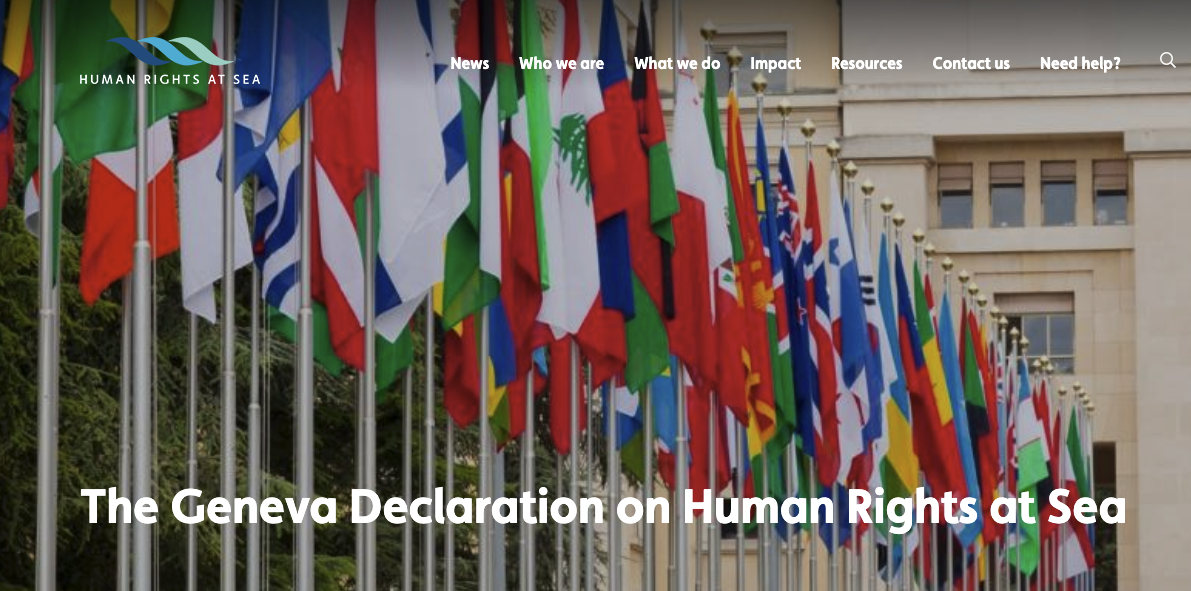The new United Nations Institute for Disarmament Research (UNIDIR) publication 'Securing the Seas' has referenced the topic of human rights at sea and the Geneva Declaration on Human Rights at Sea.
Authored by Christian Bueger, Timothy Edmunds and Jan Stockbruegger, the publication is a comprehensive review of current maritime security in the global maritime environment.
As stated: "Maritime security is a paramount feature not only of international peace and security, but also of the development, human rights and environmental agendas. Global trade, energy security, food security, sustainable development, and global communications depend on safe and secure oceans."
The inclusion of the topic of human rights at sea by the authors demonstrates the reach of the likes of a decades' work by the UK charity, Human Rights at Sea, and its supporting entities.
Geneva Declaration on Human Rights at Sea

The Geneva Declaration on Human Rights at Sea confirms that human rights apply at sea as they do on land.
Initiated and conceived in February 2019 by Founder, David Hammond, as a response to the ongoing systematic abuse of human rights at sea globally, the Geneva Declaration on Human Rights at Sea brings together existing international law into one document.
The Geneva Declaration gives practical guidance to states on how to ensure that human rights abuses at sea are detected, remedied, and ultimately ended. We are now working with individual states and the UN to promote the adoption of the Declaration.
Website: https://www.gdhras.com
[Publication Excerpt] 5.19. Human rights at sea
"Human rights are universal and apply equally at sea as they do on land. However, “there is significant and growing evidence of widespread, deliberate, and often systematic abuse of human rights at sea”.201 These abuses include issues as diverse as forced labour and slavery on fishing vessels and other ships, the abandonment of seafarers in ports far from home, the victimization of seafarers by pirates and other maritime criminals, instances of physical and sexual abuse on ships, the treatment of irregular migrants and the plight of trafficked people at sea.
The application of human rights laws and norms faces unique challenges in the maritime domain, and so requires a tailored response. This is due first to the special legal status of the oceans, which means that large areas of the sea are beyond the territorial jurisdiction of States. Under these circumstances, UNCLOS assigns responsibility for the maintenance and enforcement of human rights standards at sea to flag States, whose capacity and willingness to do so varies widely. At the same time, the relative opacity and isolation of human activities at sea means that identifying human rights abuses when they occur is difficult and often reliant on voluntary reporting by ships’ masters or crew."
Read More: https://unidir.org/wp-content/uploads/2024/11/Securing_the_seas_web-1.pdf
Reference: C. Bueger, T. Edmunds, J. Stockbruegger. Securing the Seas: A Roadmap for Enhancing UN Maritime Security Governance, Geneva, Switzerland: UNIDIR, 2024.
ENDS.
Source: UNIDIR Securing the Seas Publication.
Image: Photo credit: UNIDIR Securing the Seas Publication.
Contact: If you have any questions, please write to us at enquiries@hrasi.org.
About Sharing. We welcome the use and dissemination of our copyrighted work with full, accurate and proper accreditation.
News: ©Copyright and Intellectual Property of HRAS International 2024. All rights reserved.
